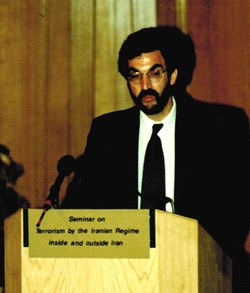 Daniel Pipes speaking at the British Committee for Iran Freedom in London. |
I am different from the preceding speakers. First of all, I am from the United States, not from Europe or Iran. Secondly, I am an analyst, not a parliamentarian. So, I will approach the subject somewhat differently.
I am going to take up two topics. First, the question of terrorism and the need for tough policies towards fundamentalist states. To begin with, I would argue that violent aggressive terrorism is endemic to the sort of government that we find in Iran today.
But before doing that, let me make this distinction that is so crucial to this kind of discussion. And that is to make the difference between Islam, the religion and the fundamentalist Islam, the ideology. Islam is a religion that is nearly 14 centuries old. It is the religion of almost over a billion people. It is the basis of a profound and very attractive civilisation.
Fundamentalist Islam is a modern phenomenon. It is an ideology in a context that is similar to other ideologies in the twentieth century. It is indeed a radical utopian ideology similar to other such radical utopian ideologies. It fits into the totalitarian legacy of the West. It is, in short, a totalitarian ideology with an Islamic flavouring. It is better understood by looking at other totalitarian ideologies of the twentieth century than by becoming a student of Islam. It is only superficially Islamic. It is profoundly ideological. It is in some ways the last major totalitarian movement of the century, the century that has seen so many such movements and has been so much hurt by them.
Fundamentalist Islam is necessarily violent and again in the tradition of totalitarian movements. It is necessarily repressive of its own people and it is necessarily aggressive towards the outside world. This audience I am sure is familiar with previous experience of totalitarian ideologies: the Fascists in Germany, Italy, Japan and other countries, the Marxist-Leninists in the Soviet Union, China, Vietnam and Cuba. All these regimes invariably repressed their own people and aggressed against their neighbours and further victims as well.
The same is true with fundamentalist Islam whether it be in Bahrain and the United Arab Emirates or in the Lebanon, where there are Iranian troops. Whether it be in Turkey, whether it be in Afghanistan, or even the United States. Incident after incident of aggression takes place.
And this brings me to my second point, which is policy. We in the outside world have basically three choices: appeasement, containment, and roll back. Mrs Rajavi has spoken about appeasement, and that it doesn't work. It didn't work with the Nazi regime in the 1930s, with the Soviet regime in the 1970s, or with the Iranian regime today.
The real choice is between containment and roll back. These are the two alternatives facing serious governments. Unfortunately, the record shows that in recent years major states in Europe and Japan in the Far East have chosen the route of appeasement. Unfortunately, it is left to the United States to be the one major government that holds to a policy of containment. And, indeed, it is the policy of containment that is tending towards rollback. We too tried appeasement. We tried it in 1979 to 1981 when we had the hostage crisis. The US Embassy there was occupied, and more spectacularly we tried it in 1985-1986 with the Iran-Contra affair.
But that is all behind us. We are not trying it anymore. And the most dramatic example of this was the vote just a week ago of 415 to nothing in the House of Representatives in favour of a Bill which is in effect a secondary boycott against Iran. That is to say that companies that invest over US$40 million a year in Iran will be under certain sanctions from a variety of choices that the President may choose from. This kind of step has its restrictions, has its limitations when it is a purely American step. There is only so much that we can do about it by ourselves. If the rest of the industrialised world doesn't go with us, obviously it doesn't have as much of an impact as it must. Still, at the same time, it is having an impact in terms of cutting off investment funds and shaking confidence in the regime.
To conclude, tomorrow the group of Seven (G7) will meet in Lyon, France. I would like to quote the American Secretary of the Treasury, Robert Rubin, who noted that "When the G7 meets, we all agree that these issues about terrorism are important and we all ought to do something about them. And then, we Americans are the only ones who do something." I call upon the European states to bring their actions in line with the United States. I call on them to take a much tougher line towards the Iranian regime in Tehran.
 The London conference. |
Jan. 26, 2019 addendum: On scanning and posting this talk, I noticed that Jeremy Corbyn, then an obscure backbencher and now leader of the Labour Party, was a fellow panelist. I scanned and posted his talk and tweeted it:
.@JeremyCorbyn & me: We both spoke at the same Mujahedin-e Khalq event on June 26, 1996. Amazingly, he gave a great anti-Tehran speech. What happened? Why did he - and all the Left - turn into mullah sycophants?
His talk: https://t.co/ZExnXZhhz7
My talk: https://t.co/eWsyarlb9U pic.twitter.com/idlEG65js9
— Daniel Pipes دانيال بايبس (@DanielPipes) January 26, 2019